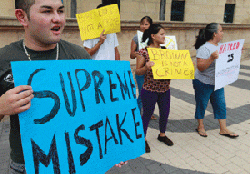On Monday, the Supreme Court agreed with lower courts that three provisions of Arizona’s Immigration Law, S.B. 1070 improperly stomped on the federal government’s role of enforcing immigration law. However, the Court didn’t block the most controversial provision of the law, Section 2(B) known as the “papers, please” provision, which requires law enforcement officers to determine the immigration status of those they stop, arrest or detain if there is a “reasonable suspicion” that the person is not lawfully present.
The Court was clear that the opinion leaves open other challenges to S.B. 1070 after the law goes into effect.

|
| Protesters at a Miami rally to protest Monday’s Supreme Court decision that allows non-federal police officers in Arizona to perform immigration checks. REUTERS |
Grant Woods, Republican former Arizona attorney general, was pleased that the court struck down three of four provisions in the law. “Yesterday’s ruling is an important victory for those who want fairness and equality in the enforcement of immigration laws,” said Woods. But he warned, “The remaining portion of S.B. 1070 will in all likelihood lead to racial profiling.”
Ali Noorani, Executive Director of the National Immigration Forum says the Supreme Court’s decision will divide the nation. “While the Supreme Court largely agreed that S.B. 1070 goes against our Constitution, it still left one dangerous provision, Section 2(B) which is the pointy end of the sword of the Arizona immigration law. The implementation of the racial profiling inherent in Section 2(B) will cause irreparable harm in Arizona.”
The Supreme Court rejected provisions of the law that allow local police to arrest people for federal immigration violations. They also cautioned local law enforcement officials against detaining people for prolonged periods for not providing immigration papers.
ACLU Executive Director, Anthony D. Romero says Section 2(B) is the most reprehensible and dangerous provision of the law.
“When local police can stop and detain anyone they perceive as “foreign” because of their skin color, their accent or their surname, it is a watershed moment for civil rights.
Our path forward is now clear. We have to work relentlessly until racial profiling is ended once and for all. The Court hasn’t yet rejected “show me your papers” laws, but America must,” Romero said.
A recent national Gallup poll found that 66 percent of Americans think immigration is a “good thing” for the U.S. today, up from 59 percent last year.
Two weeks ago, evangelical Christians, who represent one third of the American electorate and are one “bedrock element of the conservative movement”, joined the growing chorus calling for meaningful action to fix the immigration system.
“Today’s ruling takes us backwards,” stated Dr. Warren Stewart, senior pastor at First Institutional Baptist Church in Phoenix and Board Chair of the National Immigration Forum. “Arizona’s discriminatory law is an attack on the American core values of fairness and equal treatment under the law.”
“In an increasingly diverse country, it does not make sense to encourage the profiling of people because of their race or the way they look or speak,” Stewart added.
Many believe the law has already taken an economic toll on the local economy, by damaging the state’s reputation as being a state of intolerance, impacting the tourism industry and driving away taxpaying workers and consumers.
“Law enforcement in Arizona can now demand “papers” from anyone they suspect of being here unlawfully. The only criteria they could possibly be using for this supposed suspicion is the way a person looks or sounds,” Romero said.
The ACLU has launched a pledge people can sign on its website titled, “America Rejects Racial Profiling” to raise awareness. Immediately after the Court issued its ruling, the ACLU announced a special fund created by a few of its top donors to advance the group’s nationwide efforts to stop “show me your papers” anti-immigrant laws from spreading across America. So far, they’ve raised $8.77 million. Its goal is to match that $8.77 million with a dramatic outpouring of grassroots opposition to laws such as Arizona’s S.B. 1070
Nancy Cassis, conservative Republican candidate for Congress in the 11th district, issued the following statement on the Supreme Court’s decision to upholding Arizona’s “show-me-your-papers” immigration law:
“My opponent in this race, like President Obama, seeks to weaken our ability to control illegal immigration and favors allowing our borders to become open and insecure. Kerry Bentivolio is on-the-record as favoring the elimination of border controls. He has also stated that he opposes state initiatives, like Arizona’s, to control illegal immigration. I support Arizona and Governor Brewer’s attempts as a state on the frontline of illegal immigration to do all that is in their power to halt the flood of people crossing the border illegally.”
– The Arab American News (TAAN)






Leave a Reply